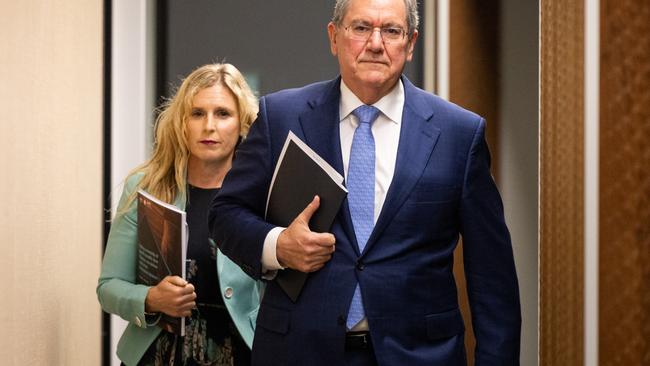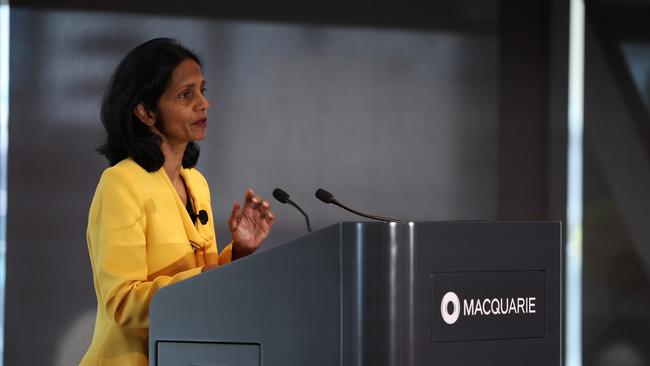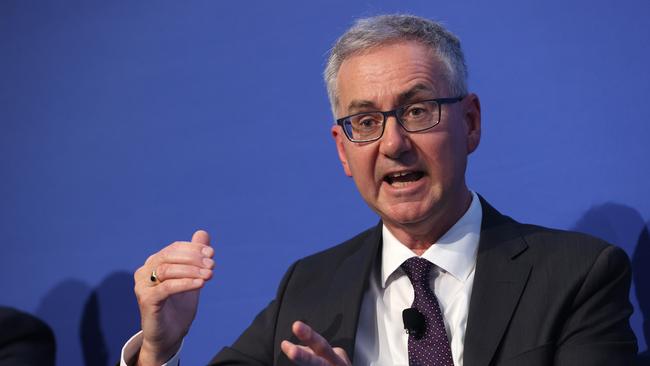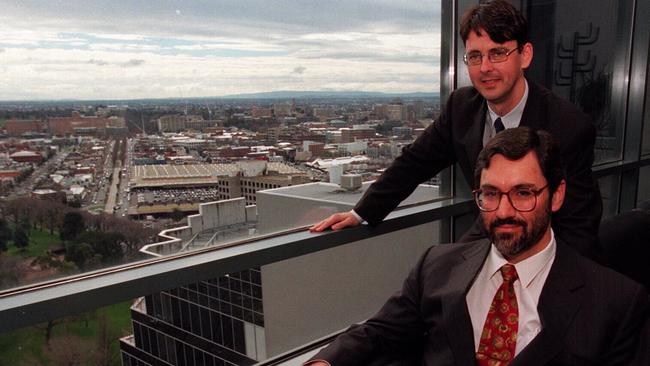ASIC chair Joe Longo turns up the heat in corporate misconduct crackdown that keeps pitting him against Macquarie Group
There’s something about the ASIC v Macquarie war that strikes fear into the hearts of the financial services industry, while spreading a distinct feeling of schadenfreude that it couldn’t happen to a nicer bank.

Business
Don't miss out on the headlines from Business. Followed categories will be added to My News.
The corporate cop is rarely a source of sympathy, much less a force of unity in the dog-eat-dog world of investment banking.
But a chill was detected passing through 1 Elizabeth Street, the modern temple to the millionaires’ factory built above a Sydney metro station on Wednesday, when the Australian Securities & Investments Commission sued Macquarie for misreporting up to 1.5 billion short sale trades in the NSW Supreme Court.
The investment bank, which paid its top 10 executives $136m in 2024-25 in salary, benefits and shares, was regulatory enemy number one.
Firing off its fourth enforcement action against Macquarie in 12 months, the Australian Securities and Investments Commission is serving up some very specific and general deterrence, in the language of enforcement, adding to the 31 matters filed with the Federal Court over 2024.
ASIC, which is in charge of regulating business in Australia, has been a frequent target of critics in its past who have lamented the agency’s failure to tackle wrongdoing.
Sometimes these critics are in parliament, such as the Liberal senator Andrew Bragg who in 2024 suggested it operate more like the US Securities and Exchange Commission because ASIC is hobbled by having too broad a mandate.
Bragg’s report, published in July 2024, found despite receiving tens of thousands of tip-offs annually, ASIC only commenced an average of 127 investigations.
Chair Joe Longo says his critics have failed to see the modern and ambitious regulator he and deputy chair Sarah Court have created over the past four years.
Longo, who recently returned to Australia from a global tour where he met peak regulators including new SEC boss Paul Atkins, says ASIC has gone through profound change since he inherited the agency in 2021.
“What you’re seeing today is not an accident, it’s what Sarah and I were planning from day one. We’d take on more court cases, it’d be more strategic,” he tells The Australian.
“When Sarah and I started that was the environment, an organisation with some serious problems.”

ASIC is preparing to reveal some key priorities now the election has been wrapped up.
As for Macquarie, which is reviewing ASIC’s claim, it stands to face a penalty in excess of $500m if it is unsuccessful in the short reporting case.
Financial licensees are legally required to report details of short interest daily. Short selling is a tool used by hedge funds to bet against the price of shares.
Macquarie realised it had a problem in 2022 when it self-reported the issue, which it claims has been remediated. ASIC disagrees.
Longo said on Wednesday Macquarie was riddled with hubris.
Self-reporting is not new, but the regime has taken on greater prominence as a source of new prosecutions.
Enhanced breach reporting requirements introduced in October 2021 replaced older rules which left the decision in the hands of boards to rule on whether matters were serious enough to go to the regulator.
Critically, ASIC has changed the way it tackles self-reported matters, dragging companies to court in a departure from the previous practice of taking a lighter touch for those who confessed their sins.
The industry, not just Macquarie, appears to have misread ASIC’s tolerance.
Longo says licensees “didn’t take seriously their obligations” under the previous regime.
“But there was always mandatory self-reporting,” he says.
How ASIC tracks down wrongdoing
The regulator, which boasts 1676 staff, knows what it’s like to be scrutinised.
It had the very public battering in the Hayne royal commission, which recommended among many supervisory and regulatory reforms that infringement notices are rarely appropriate in dealing with large companies behaving badly.
Longo says today, all of its executives share an emphasis on enforcement.
But ASIC is also deluged with tip-offs, reports and bad information, much of which is meaningless or difficult to put to use in any productive enforcement.
New technology and systems have been put in place to triage the torrent.
“The whole organisation is now much more strategic in how we’re doing our work, that’s not an accident,” Longo says.
“We intend to be active in court, we intend to be ambitious, and confident in our outlook in how we deal with regulatory problems.”
The ASIC boss also points to a number of matters added to the regulator’s hit list, including directors’ duties action against the boards of Star Entertainment and airline Rex. ASIC has also sued HSBC over failures to stop scammers and help customers.
None of these were self-reported incidents.
ASIC couldn’t be in the business of policing boardrooms or stopping fraudsters before they strike, Longo says.
“Where the circumstances enable us to get in there early and save investor funds we do,” he says.
“We can’t litigate every issue. We’re resourced to do a certain number of enforcement matters, we have to be strategic with the ones we run to have impact.”

And despite Longo’s public feelings about hubris in Macquarie’s boardroom, it’s not a suspicion he holds widely about the financial services industry.
“I don’t think we’re having a system-wide problem with complacency,” he says.
The short trade under-reporting was one of two regulatory bombs dropped on Macquarie in as many weeks.
The other was on the morning of its Sydney conference, when it published newly imposed licence conditions on Macquarie for failing to stop a string of suspicious trades aimed at allegedly manipulating the electricity market. Macquarie must report back to ASIC by June 30, and commit to a three-year remediation period.
ASIC’s taste for public justice is in contrast to the Australian Prudential Regulation Authority, which supervises the banking sector, and which often works in the shadows.
APRA for example in April revealed it would slap banking giant ANZ with a $250m capital penalty and an enforceable undertaking over non-financial risks, meaning culture, first highlighted by ASIC’s investigation into alleged market misconduct. ANZ denies wrongdoing but has agreed to a remediation plan informed by a review conducted by Oliver Wyman to deal with the issue of correcting non-financial risk.
However, APRA chose to publish its bombshell at the very moment US President Donald Trump was revealing near-catastrophic plans for a global tariff regime.
APRA proposed the timing to ANZ, which did not disagree.
Australia’s toughest regulator?
The Hayne Royal Commission also questioned whether ASIC should simply be broken up, a scenario Longo appears to have minimised but perhaps not defeated.
APRA’s last courtroom tussle saw it trounced in an attempt to prosecute superannuation player IOOF, now known as Insignia Financial.

APRA’s resistance to publicly pull up banks, insurers or superannuation funds over wrongdoing until matters are well into the open wasn’t helped by the 2019 ruling of Federal Court Justice Jayne Jagot, who was unconvinced by APRA that IOOF broke the law when it used reserve funds to make members whole.
Even Gina Cass-Gottlieb’s Australian Competition and Consumer Commission is less aggressive in court than ASIC, filing only nine cases in the Federal Court last year, well shy of ASIC’s 31.
And, the ACCC has failed to stop a single merger this financial year.
Longo is now faced with the matter of who will bear the torch at ASIC in the years ahead, with his term running out next year.
Greg Medcraft was the last ASIC chair offered an extension, adding an extra 18 months to his term.
Longo says it is too early to detail his plans.
But the support of the re-elected Albanese government will be critical if he wants to stay and fight on, or, potentially position Court as his successor.
ASIC is angling for more resources to complete the upgrades of its business registers, after being handed the project back by the Australian Taxation Office, which let the technology transformation run wild.

Longo says the agency’s enforcement approach seeded almost 25 years ago, including Tony Hartnell’s ‘Big 16’ priority cases, show it has never shied away from a fight.
“When you step back it was always part of ASIC’s remit to place an emphasis on enforcement,” he says.
“That emphasis, it was well regarded and other times not so well regarded.”
Macquarie, whose systems ASIC alleges were so inadequate that trades with four or more character cross-references were omitted from its reporting, and in other alleged instances, didn’t capture trades that crossed after 5pm, must be wondering whether ASIC’s appetite for a street fight is satiated.
More Coverage
Originally published as ASIC chair Joe Longo turns up the heat in corporate misconduct crackdown that keeps pitting him against Macquarie Group





